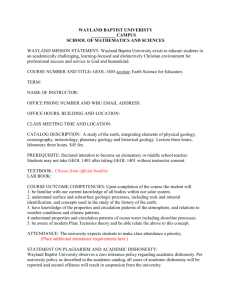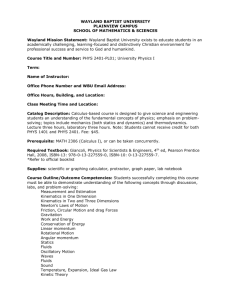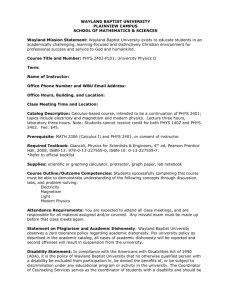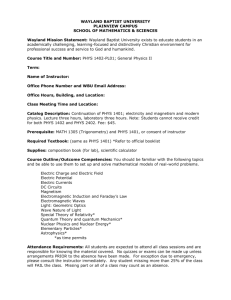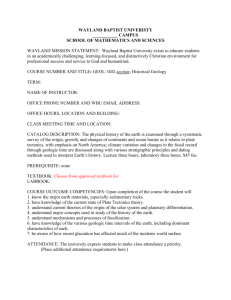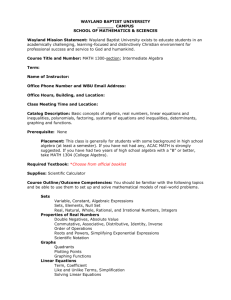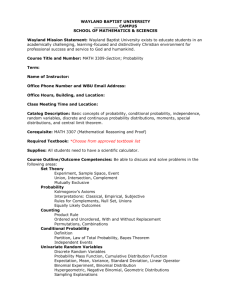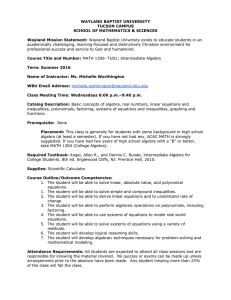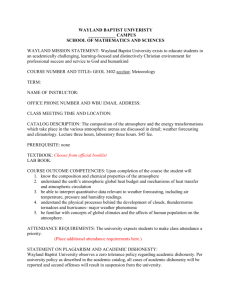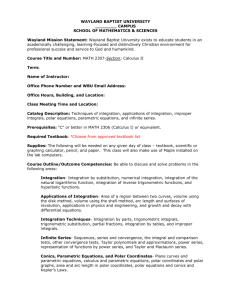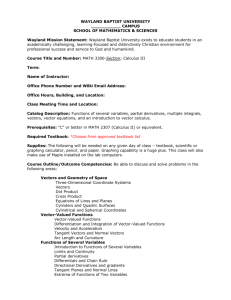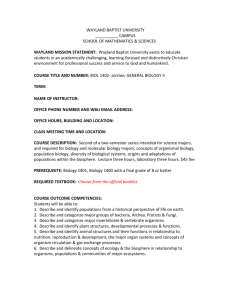MATH 4310 - Wayland Baptist University
advertisement
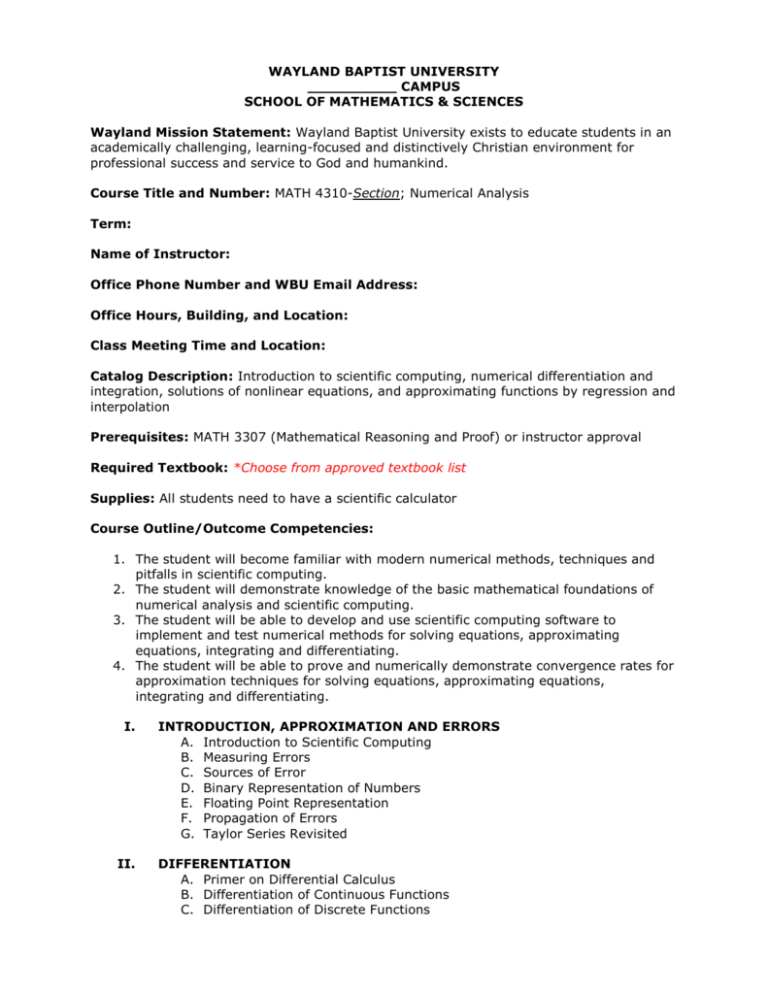
WAYLAND BAPTIST UNIVERSITY __________ CAMPUS SCHOOL OF MATHEMATICS & SCIENCES Wayland Mission Statement: Wayland Baptist University exists to educate students in an academically challenging, learning-focused and distinctively Christian environment for professional success and service to God and humankind. Course Title and Number: MATH 4310-Section; Numerical Analysis Term: Name of Instructor: Office Phone Number and WBU Email Address: Office Hours, Building, and Location: Class Meeting Time and Location: Catalog Description: Introduction to scientific computing, numerical differentiation and integration, solutions of nonlinear equations, and approximating functions by regression and interpolation Prerequisites: MATH 3307 (Mathematical Reasoning and Proof) or instructor approval Required Textbook: *Choose from approved textbook list Supplies: All students need to have a scientific calculator Course Outline/Outcome Competencies: 1. The student will become familiar with modern numerical methods, techniques and pitfalls in scientific computing. 2. The student will demonstrate knowledge of the basic mathematical foundations of numerical analysis and scientific computing. 3. The student will be able to develop and use scientific computing software to implement and test numerical methods for solving equations, approximating equations, integrating and differentiating. 4. The student will be able to prove and numerically demonstrate convergence rates for approximation techniques for solving equations, approximating equations, integrating and differentiating. I. II. INTRODUCTION, APPROXIMATION AND ERRORS A. Introduction to Scientific Computing B. Measuring Errors C. Sources of Error D. Binary Representation of Numbers E. Floating Point Representation F. Propagation of Errors G. Taylor Series Revisited DIFFERENTIATION A. Primer on Differential Calculus B. Differentiation of Continuous Functions C. Differentiation of Discrete Functions III. IV. V. INTERPOLATION A. History of Interpolation B. Direct Method C. Newton's Divided Difference Method D. Lagrange Method E. Spline Method REGRESSION A. Primer on statistical terminology B. Introduction to Regression C. Linear Regression D. Nonlinear Regression E. Adequacy of Regression Models INTEGRATION A. Primer on Integral Calculus B. Trapezoidal Rule C. Simpson's 1/3 Rule D. Romberg Rule E. Gauss-Quadrature Rule F. Discrete Data Integration G. Improper Integration H. Simpson's 3/8 rule Attendance Requirements: All students are expected to attend all class sessions and are responsible for knowing the material covered. No quizzes or exams can be made up unless arrangements prior to the absence have been made. Any student missing more than 25% of the class will fail the class. Statement on Plagiarism and Academic Dishonesty: Wayland Baptist University observes a zero tolerance policy regarding academic dishonesty. Per university policy as described in the academic catalog, all cases of academic dishonesty will be reported and second offenses will result in suspension from the university. Disability Statement: In compliance with the Americans with Disabilities Act of 1990 (ADA), it is the policy of Wayland Baptist University that no otherwise qualified person with a disability be excluded from participation in, be denied the benefits of, or be subject to discrimination under any educational program or activity in the university. The Coordinator of Counseling Services serves as the coordinator of students with a disability and should be contacted concerning accommodation requests at (806) 291-3765. Documentation of a disability must accompany any request for accommodations. Course Requirements and Grading Criteria: – suggested Homework: Homework will be assigned at the end of each lecture and is due at the start of the next class. You may work together, but do not copy. Late work will be penalized at 10 points per day. Show all your work. All assignments will be posted to Blackboard, along with the due date. Additional assignments will be conducted in Blackboard, including occasional reading quizzes and concept tests. Student Lecture: Each student will be required to present a lecture over material from the text. More details regarding these lectures will be provided. Exams: During the semester there will be 3 exams. The content covered by each exam will be explicitly discussed in class. No exam grades will be dropped. Final: The Final Exam will be comprehensive. All students will be required to take the Final Exam. For students graduating in May, arrangements must be made to take it early. Grading: % % % % Homework Student Lecture Exam Average Final A: 90 – 100 B: 80 – 89 C: 70 – 79 D: 60 – 69 F: Below 60 Students shall have protection through orderly procedures against prejudices or capricious academic evaluation. A student who believes that he or she has not been held to realistic academic standards, just evaluation procedures, or appropriate grading, may appeal the final grade given in the course by using the student grade appeal process described in the Academic Catalog. Appeals may not be made for advanced placement examinations or course bypass examinations. Appeals are limited to the final course grade, which may be upheld, raised, or lowered at any stage of the appeal process. Any recommendation to lower a course grade must be submitted through the Executive Vice President/Provost to the Faculty Assembly Grade Appeals Committee for review and approval. The Faculty Assembly Grade Appeals Committee may instruct that the course grade be upheld, raised, or lowered to a more proper evaluation. Tentative Schedule: Academic Honesty: Disciplinary action for academic misconduct is the responsibility of the faculty member assigned to this course. The faculty member is charged with assessing the gravity of any case of academic dishonesty, and with giving sanctions to any student involved. Important Dates: Last Last Last Last day to drop without record day to withdraw with “W” day to withdraw with a “WP/WF” Class This syllabus is only a plan. The teacher may modify the plan during the course. The requirements and grading criteria may be changed during the course if necessary. Revised 03/18/15
